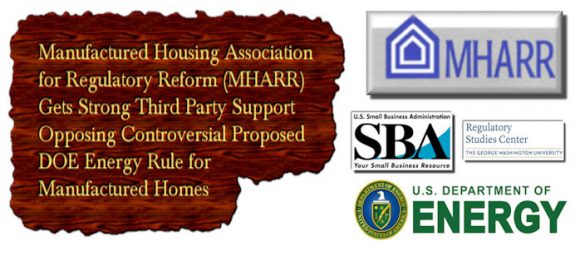
“It does not appear that DOE grasps the unique challenges that small manufacturers encounter.”
— U.S. Small Business Administration, Office of Advocacy
A controversial proposal by the U.S. Department of Energy (DOE) for manufactured housing has drawn support as well as growing opposition.
An arm of the United States Small Business Administration (SBA) and a policy analyst at George Washington University have weighed in on the DOE proposal. Both organizations are expressing concerns that mirror and amplify those advanced by the Manufactured Housing Association for Regulatory Reform (MHARR).
The Digital Journal is one of several hundred news and special interest sites that have carried word of how proposed energy efficiency standards could harm manufactured housing producers, businesses and consumers.
Reasoned Opposition Grows
Written comments to the DOE by both the SBA and George Washington University’s regulatory research program echo the vigorous objections of MHARR, which has led the opposition to the proposed rule.

Comments filed on August 16th from the SBA’s Office of Advocacy note the DOE proposal “does not comply” with federal requirements than an agency “quantify or describe the economic impact that its proposed regulation might have on small businesses.”
A separate public comment letter submitted the same day from Sofie E. Miller, a senior policy analyst at George Washington University’s Regulatory Studies Center, note that the DOE’s calculations “overestimate” the benefits of its proposed rule in several key respects.
Miller particularly notes the adverse impact on prospective low-income purchasers.
“…mandatory, across-the-board increases in efficiency will price many low-income consumers
out of the market for manufactured homes entirely.”
— The George Washington University Regulatory Studies Center
As MHProNews has previously reported, MHARR has been highly critical of the proposal.
Highlighting serious – and in MHARR’s view, “fatal” defects in the rule and the rulemaking process – which the Washington-based association says has been troubled by leaks, discrepancies and a lack of transparency.
The MH industry organization has called the DOE’s cost-benefit analysis a “sham,” they say is driven by special interests.

The George Washington University (GWU) analysis, stated the Digital Journal, “citing MHARR materials published in the industry trade journal, MHProNews“ – echoes serious concerns over anti-competitive effects resulting from the DOE proposal.
Executive Order, Third Party Research
MHARR says that of particular interest is an Executive Order issued by the President on April 15, 2016, in which the Center calls on DOE to “pay particular attention to the prospective effects of its proposed rule on competition within the MH market.”
According to recommendations from the GWU Center, “The DOE should commit to retrospectively reviewing its standard to ensure there is no conflict or overlap with existing HUD regulations and to evaluate the rule’s effects on competition within the MH market and the availability of affordable housing.”
In its comments, the SBA’s Office of Advocacy also focused on the proposal’s adverse impacts on competition, noting that the rule “would have significantly disproportionate economic impacts on small manufactured home manufacturers if finalized.”
The comments called on DOE to “adopt a regulatory alternative to the proposed standard that will minimize the economic impact to small manufacturers.”
MHARR commended these highly respected, independent organizations for filing comments on the proposed MH energy rule.
“The cost-benefit analysis for the rule is skewed to the point of being arbitrary at best and deceitful at worst.”
— Manufactured Housing Association for Regulatory Reform (MHARR)
There are rumors that the Daily Business News is aware of that suggest that if the DOE continues on its proposed course of action without correction, “other legal measures” may be taken beyond written and verbal protest.
For the complete MHARR briefing on this issue, including the reports cited above, click here. ##
(Image credits are as shown above.)

Submitted by RC Williams to the Daily Business News, MHProNews.
